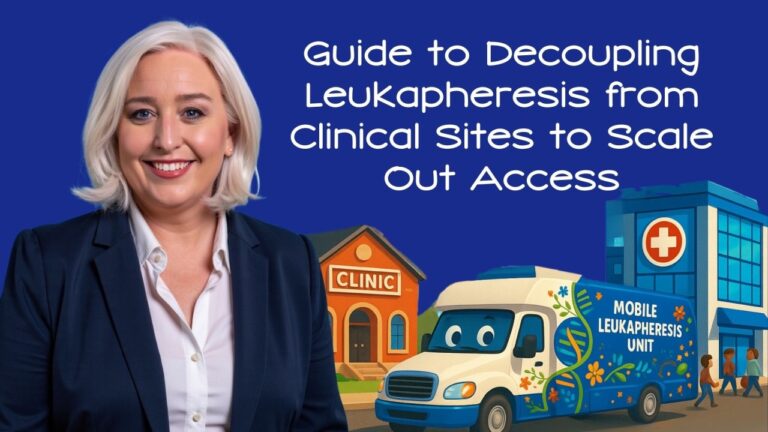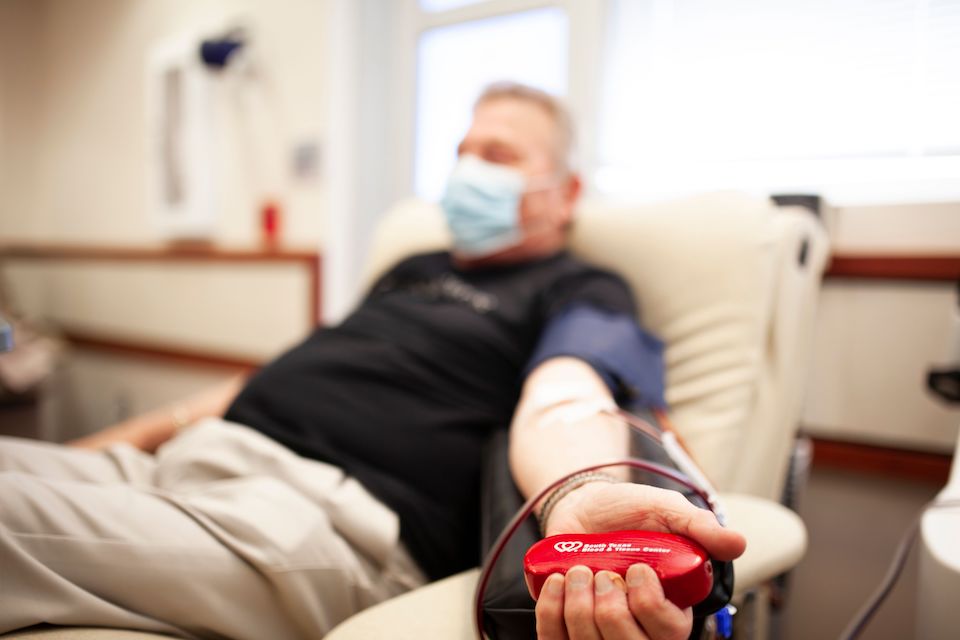Blueprint for Breakthroughs is a LinkedIn newsletter published by Adrienne B. Mendoza, MHA, SVP BioBridge Global and Chief Operating Officer (COO), BBG Advanced Therapies
Originally published on LinkedIn on May 20, 2025
In cell and gene therapy, access can’t be an afterthought. Yet too often, the leukapheresis step – the critical first action in the delivery of autologous cell and gene therapies, is tightly tied to the clinical trial site, limiting flexibility in both the development and commercial delivery phases. As a result, patient access narrows, clinical site burden increases, and the therapy’s potential to scale becomes constrained by geography, capacity, and contracting complexities.
Years spent studying these access challenges has made it clear that clinical trial sponsors and pharmaceutical companies can make pivotal progress by decoupling leukapheresis from clinical sites, creating a clear path for scale-out and flexibility across both trial and commercial phases.
In this article. I share some guidance and practical advice on what steps can be taken to clear the path, as well as access to those resources to support this adaptation in some simple steps,
The Dendreon Model: A Proven Precedent
One of the earliest commercial cell therapy products, Provenge by Dendreon, successfully pioneered a model that separated leukapheresis from the clinical treatment site. Patients had their immune cells collected at designated apheresis centers, which were contractually independent from the hospitals administering the therapy. This separation has allowed Dendreon to manage logistics, maintain quality control, and streamline site activation while reaching a broad patient population.
The key is that leukapheresis is treated not as a clinical procedure tied to one hospital system, but as a controlled step inputting the starting material to the manufacturing process – compliant, contracted, and centrally coordinated.

For Clinical Trial Sponsors: Build This into Your Design
To emulate this flexibility in your trial, consider these structural components:
- Separate the leukapheresis supplier from the clinical site in your study design and trial protocol.
- Engage GTP/GMP-qualified apheresis providers as third-party vendors, contracted under your quality agreement framework.
- Define SOPs and data flows early to preserve chain of identity and integrate logistics between collection and manufacturing sites.
- Allow for scalability by pre-identifying regional centers of excellence that can accommodate patient diversity and improve trial enrollment metrics.
- Clarify IRB coverage and informed consent boundaries between collection and treatment arms.
This not only enables more diverse site participation, but also simplifies future commercial rollout by using vendors that can support scale-out models from day one.
For Approved (Commercial) Therapies? The CBE-30 Pathway
Even if your therapy has already passed regulatory review and become an FDA-approved product, there is still a path to unlock this flexibility post-approval—without requiring a resubmission of the Biologics License Application (BLA).
The US FDA allows for a “Changes Being Effected in 30 Days” (CBE-30) notification, which enables manufacturers to modify specific approved processes if they do not adversely affect the product’s identity, strength, quality, purity, or potency.
For sponsors wishing to add or modify their leukapheresis network, the CBE-30 pathway may apply when:
- The new collection site uses FDA-cleared devices.
- No changes are made to the product manufacturing process or specifications.
- The new site operates under a quality agreement with the manufacturer.
- No negative impact to critical quality attributes is anticipated, supported by comparability and validation studies if applicable.
A Turnkey Support Package
The team and I at BBG Advanced Therapies have prepared a customizable CBE-30 submission support package that includes:
- Draft notification letter
- Site comparability justification
- Supplier qualification documentation including quality agreement
- Chain of identity procedures
- Data integrity framework
This package is designed to help our partners accelerate market access without compromising compliance or quality.

Leukapheresis shouldn’t be a bottleneck. Whether you’re planning your first-in-human study or looking to broaden commercial access, decoupling the Apheresis site from the clinical site can enable flexibility, improve trial diversity, and support scalable therapy delivery.
To learn more or request the CBE-30 Leukapheresis center support package, please reach out to:
Adrienne Mendoza | adrienne.mendoza@bbgat.org
Visit BBG Advanced Therapies at www.bbgat.org



